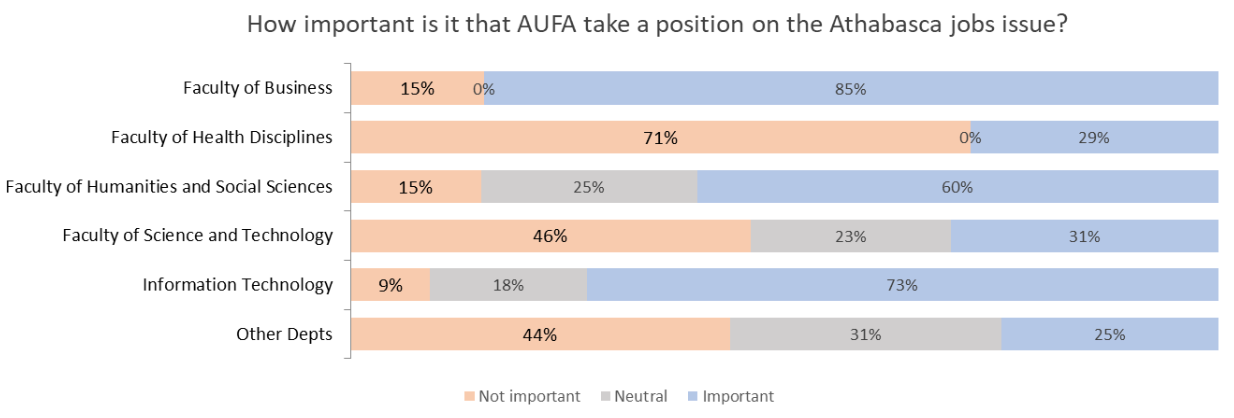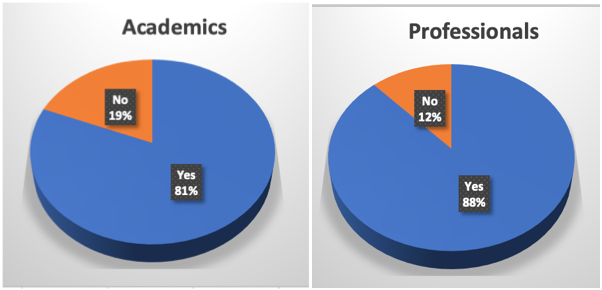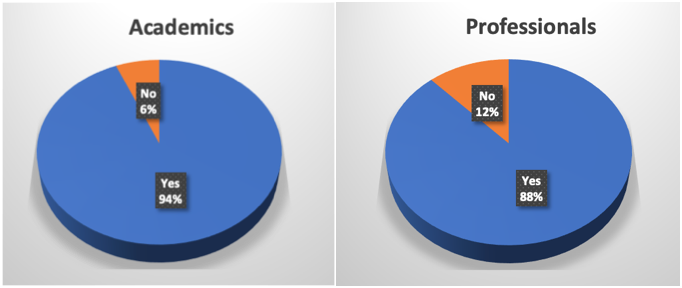In June, volunteers with AUFA’s Membership Engagement Committee (MEC) completed the sixth membership engagement survey. This survey included the usual climate questions as well as explored issues related to the recently concluded round of bargaining, the jobs in Athabasca issue (which has since become a significant issue), and AU’s implementation of Netskope surveillance software on members’ computers.
This iteration of the survey was delayed from the targeted April/May timing, which likely impacted response rates. Eighty-two randomly selected members (just under 20% of the membership) completed the call-based survey, with representation across departments and employee types.
Climate Questions
Survey callers asked four recurring questions on the general climate at AU. Overall, members report continued distrust in the AU executive, while AUFA’s work is broadly supported. There is an interesting discrepancy between the 39% of members who reported high morale compared to 77% who reported enjoying starting work in the morning. This likely reflects members’ appreciation for the work they do while also reflecting their frustration with their working conditions.
Looking further at the question of trust in AU’s executive team, there was a slight increase since the last survey (in fall 2021), from 15% to 20% expressing trust, which is still far below the highest rate of 30% who agreed with this question in the very first survey (in fall 2019). There were no clear trends in terms of which member groups are more or less likely to agree or disagree. For example, when analyzing responses based on length of service, new hires reported around the same level of distrust in executive and trust in AUFA as longer-serving staff.
In the comments provided by members regarding AU’s executive, most expressed strongly negative feelings, with the following emerging as themes:
feelings of being mistreated, belittled, or disrespected by the employer
dissatisfaction with the communication and information provided to faculty and staff
perceptions of mismanagement, ineptitude, or hidden agendas
perceptions of a lack of understanding of the university’s culture and values
desire for following through with a vote of non-confidence in the current executive
In terms of factors contributing to these feelings, the employer’s opening position in bargaining featured prominently. Members also spoke about how the various reorganizations at AU—including the IT reorganization and the near-virtual transition—have been and continue to be handled poorly, which is negatively affecting morale.
Contract Negotiations
Having narrowly avoided a strike this spring, MEC queried members’ willingness to have withdrawn their labour. The vast majority of members (88%) indicated were likely to have withdrawn their labour during a strike or lockout, with just 6% saying they were unlikely. This reponse suggests AUFA’s strike threat was a credible one. A credible strike threat enhances the bargaining power of the union.
Members had mixed views about the final contract that was ratified. The largest chunk of repondents (44%) indicated they were “somewhat satisfied”; neutral and “somewhat dissatisfied” responses each received 22%. Very few members indicated they were either very satisfied (5%) or very dissatisfied (about 7%). This distribution of responses suggests that members are feeling rather ambivalent about the settlement.
Survey respondents provided a wide variety of comments on the contract language, but the issue most members identified as concerning was (unsurprisingly) the loss of Research and Study Leave for professional members. Comments were broadly aligned with the discussion among members during bargaining, which includes broad, but certainly not unanimous, support for this benefit.
In addition to the RSL issue, cost of living, inflation, and wages were frequently mentioned. Members broadly felt the cost-of-living adjustment was inadequate. Cost of home office was identified as needing to be addressed.
Jobs in Athabasca
As previously reported, a majority of respondents (73%) supported AUFA’s current position that, while no current AUFA member should be forced to re-locate, AU should make an effort to hire a portion of new staff to the Athabasca area. MEC also asked if AUFA should take a position on this issue at all, and a majority (67%) agreed that it should.
Understanding that, as a union, we are often dealing with multiple priorities, MEC also asked about the relative importance of this issue. There was more disagreement on this question, with only 51% of respondents suggesting it was important that AUFA take a position. That is, there seems to be a portion of members (about 15–25%) who think AUFA should take a position and who agree with AUFA’s current position, but who don’t see this issue as a top concern. There were some identifiable differences when analyzing this question in more detail, so it’s worth taking a look at where some of this discrepancy comes from.
There were some notable differences here when comparing new employees with those who have been at AU for longer. This issue is important to just 31% of employees who have been at AU fewer than 10 years, while 81% of those who have been at AU more than 20 years said this issue was important to them.
It is also worth noting that support for AUFA’s position on this issue varies widely between faculties and departments, with the strongest support in FB, FHSS, and the IT department, and weakest support in FHD, FST, and other departments.
Member comments were diverse. Some members noted that requiring candidates live in Athabasca may narrow the applicant pool unacceptably. Other suggested that candidates could be enticed to live in Athabasca through meaningful incentives.
Some members felt AU’s primary role is to educate students, not contribute to the economy of Athabasca. Other members note that AU’s location was chosen for economic development purposes and there is no necessary conflict between providing online education while having a portion of jobs located in the Athabasca area.
Other members were concerned that successive Boards and executives had mishandled this issue (primarily by ignoring it) and that the government was intervening due to political pressure. Some members suggested that the university executive should be expected to model a commitment to Athabasca by living in the Athabasca area, at least part of the time. Others suggested rethinking this issue in order to take advantage of the possibilities a rural campus offers.
While a lot has happened since this survey was conducted in June, the AUFA executive’s open letter points to several ways in which this issue might be resolved in a constructive and mutually beneficial way.
Netskope and Privacy
Members were strongly in favour of AUFA taking steps to protect their privacy after AU installed surveillance software called Netskope on member computers without forewarning or data governance.
Members’ comments provide many insights about their concerns with this program being used on their work computers, with some common themes:
It constitutes a breach of privacy. Members feel concerned about this being a breach to their right to privacy, confidentiality, and security in the workplace.
It creates a culture of mistrust between workers and the employer, as they feel not trusted and feel spied and surveilled by the employer.
Lack of transparency. Members manifested being concerned about not being properly informed on the reasons why this program is being used, about the data that is being collected, and about the implications that this may have for their privacy in the workplace.
It jeopardizes research participants’ right to security, anonymity, and confidentiality. Members who manage and storage research data collected among vulnerable populations (including Indigenous, racialized, and those with precarious legal status) think that the tracking of this information jeopardizes the security of research participants and their right to confidentiality and privacy, making researchers to incur in violations of research protocols.
Lack of informed consent. Members feel concerned about the fact that the decision to install a program to collects information was made on a top-down manner, without previous consultation, proper notice, or consent.
Insecurity in the workplace. Members fear that the information that is being collected can be used to punish those engaged in disputes with the employer.
Threat to safety. Members feel unsafe in the workplace, as they have no clear understanding of what type of information is being tracked and collected, and as they have no clear understanding if this information includes family/personal information.
It affects productivity and morale, as the feelings of being spied “all the time” discourages engagement with the job. It also discourages the search of information that can be seen as “suspicious” from the point of view of the employer.
There are no clear policies and rules governing the use of this software in the workplace.
The AUFA executive is following up with the employer about the use of this software and the timelines for a privacy impact assessment, but have so far received no new information.
The survey also asked members about their use of the AUFA website. This feedback has been shared with the communications committee and will help inform future work to improve the website for members.
MEC extends its thanks to its volunteer callers as well as the members who took the time to answer the survey. The next MEC survey is planned for this fall. If you would like to be volunteer to help with survey calls, please email engagement@aufa.ca.
Rhiannon Rutherford
AUFA President














